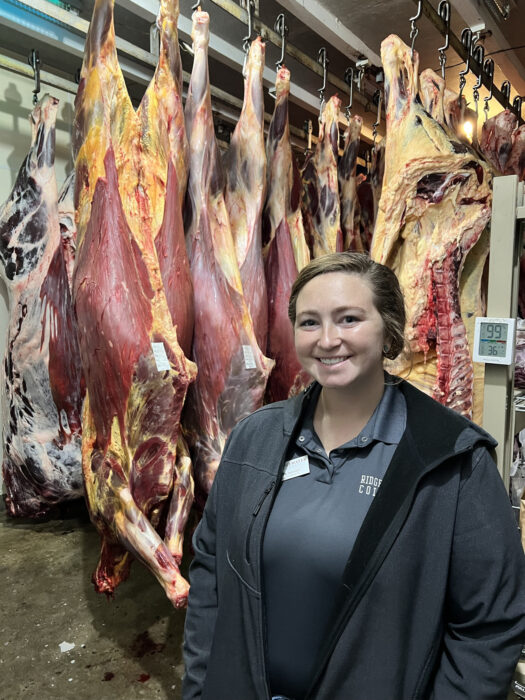Meat Cutting Program Expanding with $625,000 Grant
March 2, 2023

WILLMAR and HUTCHINSON, MN – When Ridgewater College launched its Beginning Meat Cutting certificate last fall, planners were excited to help meet industry needs, but also optimistic that the certificate would be just the first of several options.
Ridgewater has indeed now secured a $625,000 federal U.S. Department of Education AgCentric grant that will support the development of two additional certificates: Advanced Meat Processing and Meat Cutting Entrepreneur, each of them totaling 18 credits and including both current and new courses. Funding, which will support the program expansion through August 2025, will cover faculty and content expert time to develop and then deliver the curriculum and educational lab experience requirements to meet educational needs. In addition, it will support and include the development and execution of strategic marketing and outreach, some facility leasing, and equipment purchase and installation as needed.
“This is very exciting for the program and the college as a whole to be offering meat cutting courses at the three levels,” said Sophia Thommes, Ridgewater’s Meat Cutting instructor. “This will help with the nationwide need for butchers and meat cutters alike. This grant will help this program hopefully have a sustainable future.”
“The intent of the program is to keep students within their local communities,” explained Jeff Miller, Ridgewater College dean of instruction who will oversee the grant. “We will not be using college facilities, but will instead lease space where we anticipate student interest in a collaborative process that benefits both the student and the partner facility.” Lease costs include space use plus contribution to regulatory compliance licensing and insurance expenses.
Ridgewater began work to develop the first certificate back in March 2021 and graduated its first Beginning Meat Cutting cohort in December 2022. Planners consulted local and regional industry partners and experts and reviewed case study research by the University of Minnesota to corroborate the need. Key environmental findings include unprecedented increases in customer demand, difficulty accessing a reliable labor force, business declines in wholesale markets, and an acute shortage of slaughtering capacity and low business incentives to serve this need.
The new Advanced Meat Processing will include five newly developed three-credit courses to be developed in Spring 2023 for delivery in Spring 2024. The Meat Cutting Entrepreneur certificate will include existing Small Business Management courses and newly developed courses to support students who want to pursue business development or purchase an existing business. Plans are to develop those necessary courses during the 2023-24 academic year for delivery in the 2024-25 academic year.
“The delivery of these academic programs is unlike anything we currently offer at Ridgewater College.,” explained Miller. Like the current Beginning Meat Cutting certificate, the delivery of the two new certificates will be a hybridized instruction format including both online and in-person lectures for about 20 hours a week, as well as live, hands-on laboratory experiences, similar to the traditional apprenticeship model for an approximately 20 more hours per week under the expertise of a credentialed faculty member.
The project will utilize the expertise of Ridgewater’s Meat Cutting faculty, its Agriculture Department coordinator and the Minnesota State Northern Agriculture Center of Excellence, also known as AgCentric, to actively conduct outreach to students of color and underrepresented populations including gender-specific resources.
The Meat Cutting program has a few appropriate industry-recognized credentials associated with the students’ entering employment. The Serv-Safe and Hazard Analysis Critical Control Point (HACCP) Systems food safety credentials are widely accepted as foundational certification in the industry but are not required for entry-level employment. These credentials will be taught in the Introduction for Food Safety courses.

